From teahouses to tournaments: Inside Chengdu’s transformation into a global events hub
Best known for its teahouses and laid-back charm, Sichuan’s capital is reinventing itself by turning global events - including esports tournaments - into engines of growth.
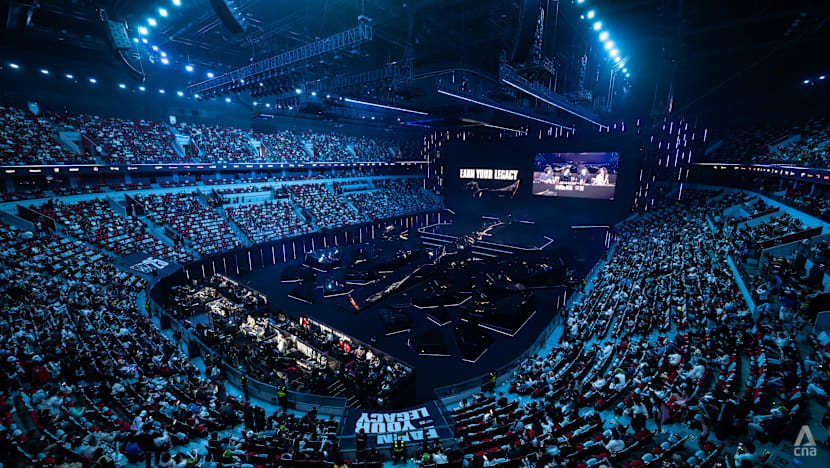
The League of Legends World Championship event takes place at the Dong’an Lake Sports Park Multi-Purpose Gymnasium. (Photo: CNA/Hu Chushi)

This audio is generated by an AI tool.
CHENGDU, Sichuan: It was nearly dawn and Chengdu’s streets were already stirring.
Along Chunxi Road, a historic pedestrian street in the heart of the city, hundreds of people dressed in jerseys, some clutching dolls and other merchandise - waited beneath a gleaming 10-metre-tall silver trophy cup that hung from a rooftop above.
These were fans of the multi-player game League of Legends (LoL), queuing to redeem free merchandise for this year’s world championship finals.
Billed as the “World Cup of esports”, the event, held on Nov 9, drew thousands of gaming fans from around the world.
Tickets were priced between 688 yuan and 1,788 yuan (US$95 to US$245) and sold out almost instantly, organisers said.
By 11 am, all official limited-edition items had been claimed, they added.
Local police also stepped in to control the growing crowds.
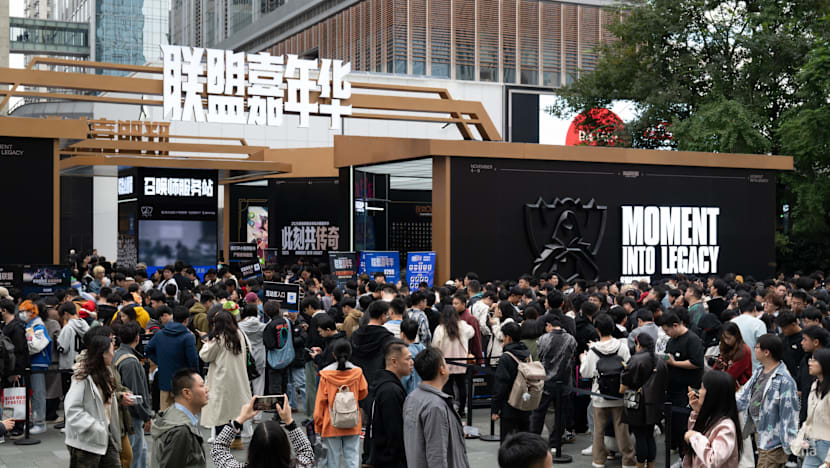
The real spectacle took place hours later at Dong’an Lake Sports Park, a major sports complex located around 21km away - where nearly 18,000 spectators, including fans from Romania, Austria and Singapore, watched top teams battle it out on stage.
“Fun fact, I shouldn’t even be here but when T1 (a South Korean esports team) qualified, I rushed to get my visa and flew to China for this,” said Jasmine Agustin, 24, a journalist from the Philippines.
Also among the crowd were two Austrian students, who said being there had been “eye-opening”.
“China is completely different from Europe,” Emil Kolba, 21, told CNA. “It’s so much bigger than we thought. The metro (transport), the way you pay for everything. It’s fascinating,” he added.
For others, the weekend was just as much about tourism and exploring China as it was about the event itself. Eng Jiaying, 28, flew to Chengdu from Singapore with four friends. The group did not manage to score tickets but still found ways to enjoy themselves anyway.
“We came for (the championship) and to explore a new city,” Eng said, adding that getting around Chengdu was easy and people were “very friendly”.
They later travelled to Chongqing and planned a day trip to the Jiuzhaigou national park before flying home.
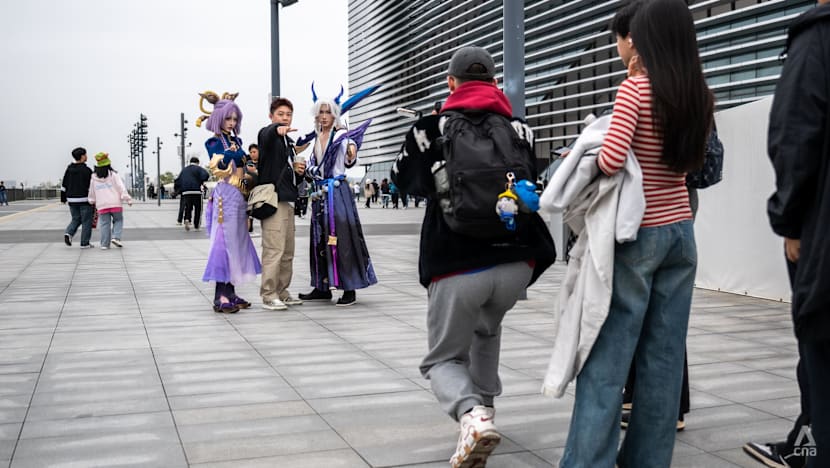
For Chengdu, the cheers were more than just the sound of fandom. They were another step to larger ambitions - a long game to turn sports, spectacle and lifestyle into engines of economic growth.
Since 2017, Sichuan’s capital has hosted nearly 100 international tournaments - ranging from sporting events like the 2023 FISU Summer World University Games to the League of Legends Championship - as part of its “build the city through events” strategy or “yi sai xing cheng” in Chinese.
Officials said the goal extends well beyond tourism: to boost Chengdu’s service economy, enhance liveability and raise its international profile through a thriving sports and leisure culture.
“These events are no longer just cultural showcases - they’re part of Chengdu’s globalisation strategy,” said Cai Dongliang, a professor at the Southwestern University of Finance and Economics (SWUFE)’s School of Finance.
Chengdu has come a long way, Cai added, from a mere “local city” to an “international metropolis” today.
It’s a playbook closely aligned with the Chinese government’s broader vision. The country aims to build and develop a thriving 7 trillion yuan sports industry by 2030, anchored by a network of “internationally influential” sports companies and global events.
Chengdu’s approach fits neatly into that blueprint.
“By 2035, Chengdu aims to become a world-renowned city of sports events,” said Zuo Yifan, an assistant professor from Shenzhen University’s School of Physical Education.
“The idea is to benefit citizens, grow industries and build the city through sports,” Zuo said, adding that this means tying high-level competitions to better urban functions and quality of life.
A CITY BUILT ON EVENTS
The Dong’an Lake Sports Park is more than just a tournament venue - its construction tells a larger story.
With more than 320,000sqm of built facilities, the venue, built to host the FISU Summer World University Games, has become a centrepiece of Chengdu’s event-led development - emblematic of a city seeking growth not only through factories or finance, but through stadiums, festivals and global attention.
Hosting the World University Games, one of the world’s largest multi-sport events for student athletes, proved a turning point for Chengdu.
Preparing for it spurred a construction wave: 13 new venues were built and 36 others refurbished, many equipped with smart systems designed for long-term public use.
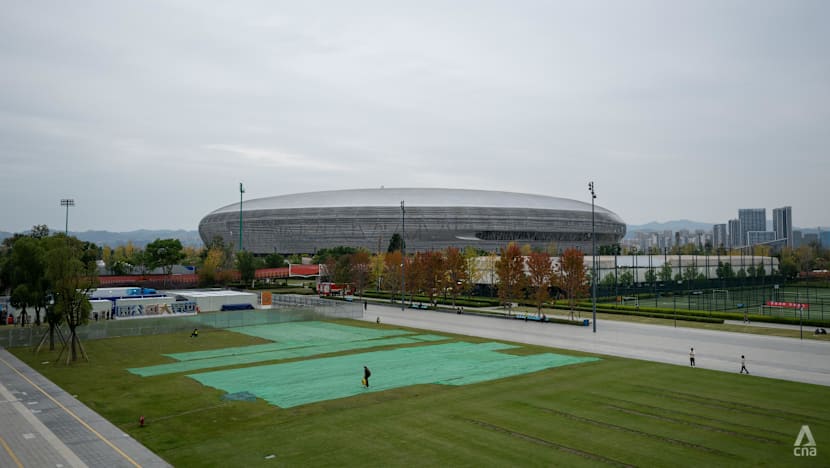
What followed was a chain reaction of global events. The World Police and Fire Games, the 2024 Thomas and Uber Cup, and the World Games, which drew more than 220,000 ticketed spectator visits and generated 2.36 billion yuan in related consumption, according to Sichuan provincial data.
According to Trip.com Group, inbound travel to Chengdu during the World Games this August rose 31 per cent year-on-year, driven by visitors from Europe and Southeast Asia.
Family and group trips made up an increasing share of arrivals, while hotels near popular zones like Chunxi Road and Taikoo Li district reported occupancy rates exceeding 90 per cent.
“The combination of world-class events and Chengdu’s leisure culture is proving to be a powerful draw,” Trip.com Group said.
Ma Yuqian, who runs a 15-room ZYQ esports hotel in central Chengdu, told CNA that while she hasn’t seen a dramatic spike in occupancy rates during the League of Legends final, sports spectators still consistently filled rooms.
“People here love esports, so the hotel is always full even on weekends,” Ma said, adding that most of her guests were domestic travellers.
Retailers, too, have benefited from the wave.
At Li-Ning’s flagship store on Chunxi Road, beside the League of Legends official merchandise booth, fans queued to photograph three real championship trophies that were displayed in the window.
The store also offered limited-edition gaming gifts with purchases, part of a short sales campaign that “lifted sales in recent weeks”, according to store officials.
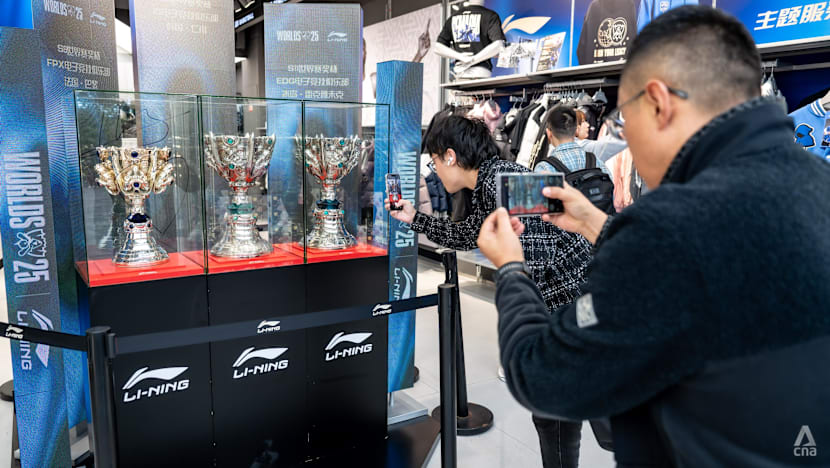
Experts said this is exactly the ripple effect which city officials have been hoping for.
“Athletes, spectators and fans all bring spending on accommodation, dining, tourism and shopping,” said Zhang Keyun, a professor at Renmin University’s School of Applied Economics in Beijing.
He added that Chengdu’s economy is dominated by services, so the spillover from events fits neatly into the city’s industrial structure.
“You can’t build an event city just anywhere,” said Zhang.
“It takes scale and venues to host top-tier competitions,” he added.
Zhang described Chengdu as “the economic centre of western China”, noting that it is “one of the few Chinese cities with two international airports” and a historic cultural city with “deep cultural roots” that help lift it on the global stage.
With the opening of the Tianfu International Airport in June 2021, Chengdu has become the third city in China, after Shanghai and Beijing, to operate two international airports.
CAN CHENGDU KEEP THE MOMENTUM?
Urban development experts said the key is how Chengdu converts short-term spectacles into long-term assets.
“The wins aren’t just ticket sales, they lift everything around them: hotels, dining, tourism and transport,” said Xi Guangliang, a research fellow at Nanjing University’s School of Architecture and Urban Planning.
“And the venues stay busy rather than idle - concerts, events, community sports - that’s what keeps an event alive after the spotlight fades.”
When the League of Legends final ended, Dong’an Lake Sports Park barely had time to catch its breath.
Just days earlier, it hosted Chinese singer Zhou Shen and by the end of the month, Hong Kong veterans George Lam and Sally Yeh are set to take the stage.
Within Dong’an Lake Sports Park, snack stall Cai Dapang Fried Potatoes rarely sees a quiet day.
“There’s always a crowd,” said its manager Li Meilin, 25. “There are concerts and shows almost every week.”
Officials call this approach “one investment, many uses” - opening stadiums and arenas to the public, with many offering free or low-cost access to popular sports such as swimming, football and basketball.
That flexibility gives Chengdu a fighting chance against the “white-elephant” fate that has haunted other Chinese host cities, said Xi from Nanjing University.
Mega-events only matter if venues stay alive after the headlines fade, he added.
Nearly 70 per cent of Chengdu’s GDP now comes from services, from tourism and retail to culture and tech, according to the city’s latest statistical bulletin.
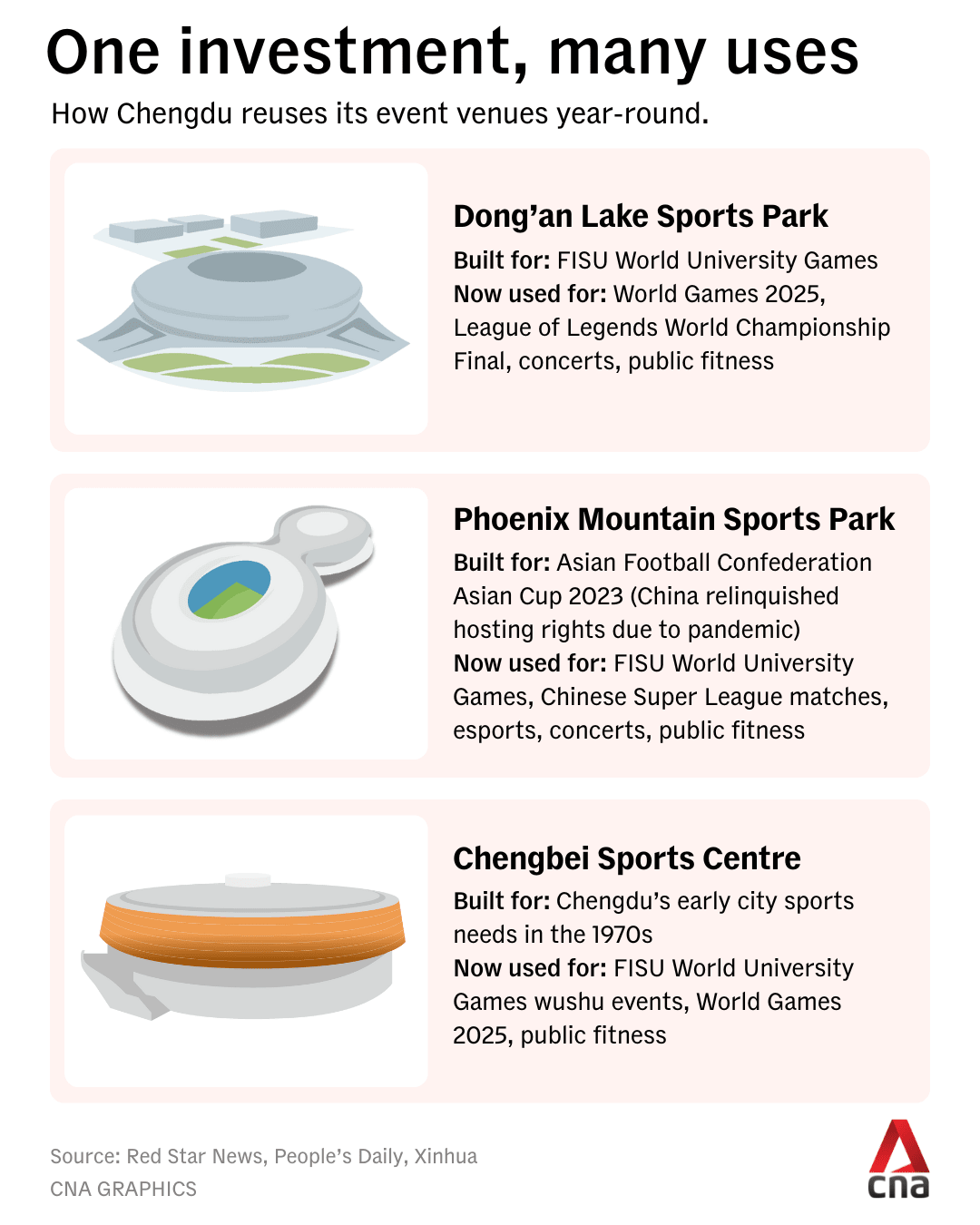
Analysts said sustaining that momentum will require a shift from one-off spectacles to recurring fixtures.
“You can look at Guangzhou’s Canton Fair, its influence is enormous,” Zhang said, noting that cities cannot host everything every year and must prioritise sustainable, repeatable events.
“The Su Chao league has shown how a single competition can lift spending across multiple cities,” Xi said, referring to how the tournament drove retail, dining and accommodation growth in Nanjing and other Jiangsu cities.
The football league has become a national case study in sustainable sports consumption.
It drew 2.4 million live spectators in its first season, officials said - and for every yuan generated by ticket sales, an additional 7.3 yuan was generated for local spending by attendees.
One of its host cities, Nantong in coastal Jiangsu, is now exploring a joint edition with Quanzhou in southeastern Fujian, after both cities saw tourism and retail surge by more than 40 per cent on match weekends.
For Chengdu, its advantage lies in merging sports with lifestyle, said SWUFE’s Cai.
“These events drive not only economic growth, but also Chengdu’s cultural and international development,” he said, adding that long-term growth would depend on linking major tournaments to what the city already does best: leisure, culture and hospitality.
FROM EVENTS TO EVERYDAY: CHENGDU’S PLAYBOOK
Chengdu isn’t just hosting world class tournaments - it’s building an ecosystem around them, experts said, with the goal of making sports and recreation part of everyday life.
Under the “park city” masterplan, new sports parks have also been added.
The Tianfu Greenway, planned at 16,930km and now more than 9,000km complete, includes an iconic cycling path spanning nearly 100km offering scenic views of nearby mountains, forests and wetlands.
Wang Pu, a 37-year-old local cyclist, said the Greenway has greatly transformed his daily routine.
“The cycling community in Chengdu just keeps growing,” he said.
“So many people are joining in. It’s already one of the city’s calling cards.”
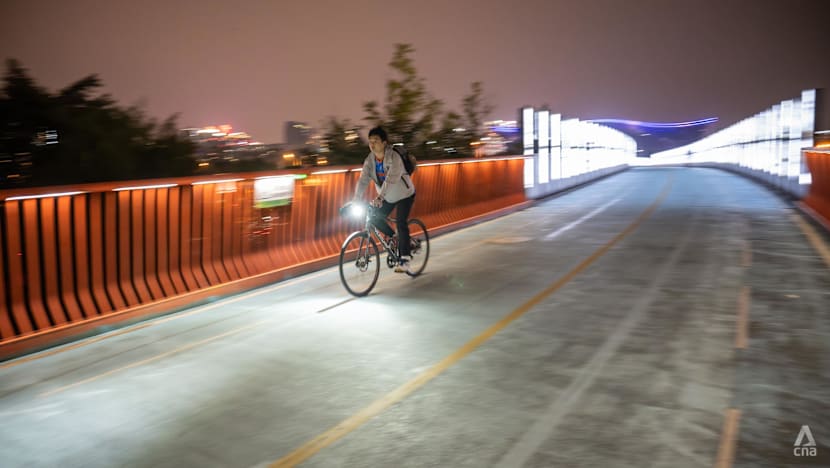
Under a flyover on Renyi Road, 70-year-old Mr Li leaps to return a serve across a faded table-tennis table, the ball snapping sharply against the steady hum of traffic - and the clatter of mahjong tiles from a hundred tables nearby.
Around him, retirees rally, stretch and laugh, their matches spilling into easy conversation.
Daily exercise keeps him feeling young, Mr Li told CNA. He’s been a regular at the venue for more than a decade.
His movements are brisk, his voice strong and carrying easily above the noise around him.
“I come here every day,” he said. “It’s a good way to stay active and meet friends.”
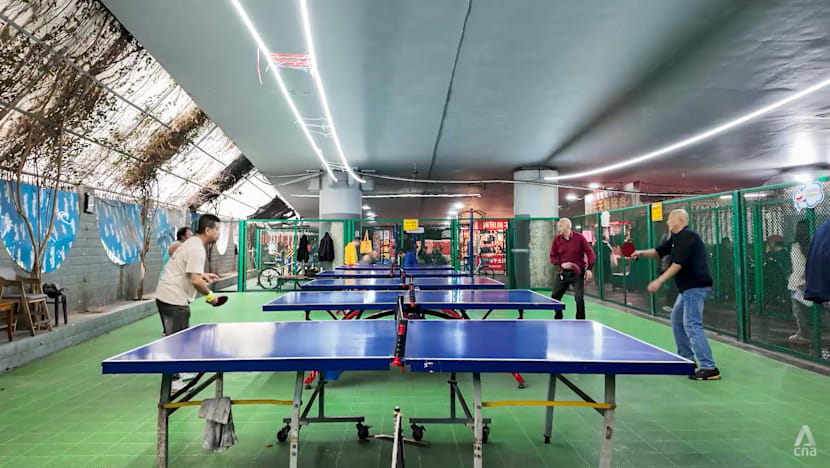
Scenes like this capture Chengdu’s quiet fitness revolution.
Once known for its teahouses and slower pace of life, the city has become one of China’s most active and health-conscious urban centres. Nearly 9.4 million residents now take part in regular exercise, according to data released by the Chengdu Sports Bureau in 2024.
A key driver is the city’s National Fitness Implementation Plan, which maps out a “fitness circle” that ensures residents can reach sporting facilities within minutes of their homes.
The West Village Basis Yard features a 1.6km sky track - a loop circuit for activities like running, cycling and training.
Designed by renowned Chinese architect Liu Jiakun, the track winds around five floors of cafés and shops, overlooking a sunken courtyard lined with football and basketball courts and shaded rest areas.
From dawn to nightfall, the complex buzzes with activity - joggers racing the track while families and students rest and move through its layered terraces.
Yang, a 63 year-old resident who lives across the street, said he began a 10,000-step routine after the facility opened in 2015. “I walk here twice a day, two hours each time, morning and night. Sometimes I head to a nearby park too,” he said.
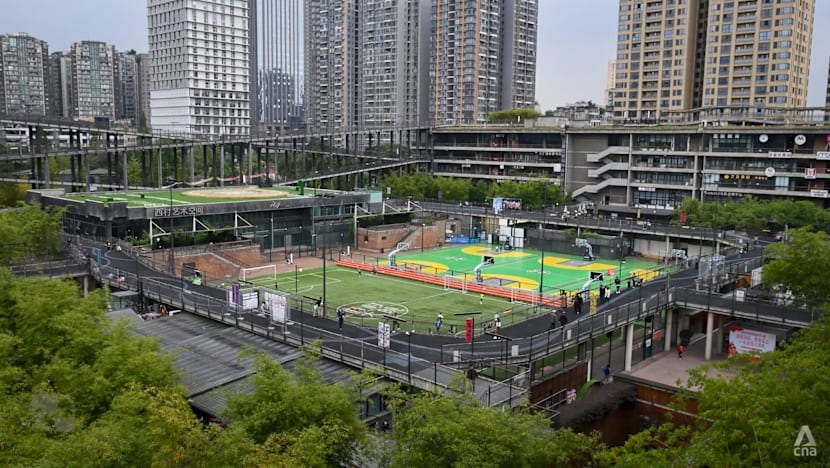
Today, the complex hosts more than 120 outlets, about 30 per cent of which are linked to sports or wellness.
“Our venues are different from professional arenas - they’re open to everyone, not just athletes,” said Ni Wenhong, general manager of Chengdu Culture & Tourism Group’s West Village Basis Yard.
“With the University Games and city games driving interest, fitness has become part of daily urban life,” he said.
Inside the same building are two municipal sports bureaus, the Chengdu Event Operations Centre and the Chengdu National Fitness Centre, which allow community programmes to be coordinated under one roof.
That makes organising events and securing approvals far smoother, Ni told CNA.
Even smaller sports have felt the lift.
Wang Shun, manager of the Bonazenmei Cheer and Dance Club, said interest spiked after the League of Legends event featured cheerleading.
“We’ve been getting around 10 new sign-ups every month,” he said. “Having this (West Village Basis Yard) in the city centre helps because parents don’t have to travel far.”
In Wuhou District, 60-year-old retiree Chen dribbled his basketball alone on a neighbourhood court.
Exercise keeps him grounded, he said. “It’s better than sitting at home,” he added, resting his hands on the ball.
At West Village, a teacher rallied with his seven-year-old son over a table tennis net, their laughter echoing across the open hall. “It’s our weekend habit,” he said. “Good for him, and for me too.”
Near Chunxi Road, a vendor selling fermented hairy tofu watched departing League of Legends crowds drift by.
“Different people, same city,” she said. “There’s always something happening here.”

















